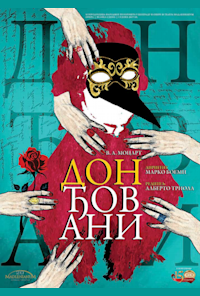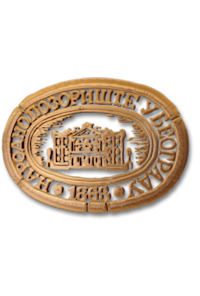After two delays, a new opera by the Viennese composer Wolfgang Amadeus Mozart, the celebrated author of "Figaro's Marriage", is finally being shown at the theater, which has been rented to a prominent Italian opera troupe in Prague. He and his librettist, court poet, abbot, Lorenzo da Ponte, this time chose a well-known and favorite story for the Prague audience about the fearless, insolent seducer, the legendary Spanish nobleman Don Juan. Prague, music and great fans of Italian opera, listen to Mozart's melodies: at balls, in pubs, from street performers, and that is why Mozart's entry into the orchestra is greeted with triple applause, which is otherwise intended only for rulers. Mozart has confidence in his singers and the audience, and he knows that a new work, bold and unusual, must win over connoisseurs. And he was not deceived because the success from play to play only grew, and the newspapers wrote that "it has never been like that before". The first to take the stage was the character of Don Juan, a brave conqueror of women, the Spanish monk Gabriel Teles, known under the pseudonym Tirso de Molina in the play "The Seducer from Seville". In 1665, Molière psychologically deepened this theme, under the name "Don Juan or the Stone Guest", which deviates significantly from the improvisations of Italian traveling troops. Carl Goldoni's treatment is one of the less successful and did not stay on stage for long. In Germany and Austria, various pieces about the legendary seducer are shown throughout the eighteenth century. From 1783 to 1821, the Vienna Theater in Leopoldstadt performed one comic adaptation of this work without interruption. Later, famous literary adaptations were given by Pushkin, Merimee, Grabe, Bernard Shaw and others, and Max Frisch wrote the play " Don Juan or the love of geomatry ”. "Don Juan" is sung for the first time "in Italian in Brno in 1734, then he is a hero in Gluck's ballet of the same name", and then a number of then successful composers create operas with this theme. According to experts, on copyright, the libretto of Mozart's opera is a very clever compilation of various, hitherto known arrangements of popular action.Mozart and Da Ponte certainly collaborated on the libretto, but the requirements of the composer and his direct participation in the processing of individual scenes cannot be established. composing in the spring, he worked intermittently until the end of the summer and went to Prague with an unfinished score not at the beginning of September, as it was considered until recently, but on October 1, to meet with his performers only on October 3! horom, with the aria of Mazet from the first act, the introductory duet of the second act, the canzonetto of Don Juan and the whole famous finale of the second act will be written only during the rehearsals! Today, even the tunes would not be announced during that time. The premiere, scheduled for October 14, as part of the stay in Prague of Archduchess Maria Theresa and her husband Prince Anton of Saxony, had to be postponed first to October 24 and then, due to the illness of one singer, finally set for October 29. The librettist Da Ponte will also arrive in Prague at the beginning of October, but he will stay only a few days, because rehearsals of the new Salieri opera were waiting for him in Vienna. By moving the premiere, another six days of rehearsals were given and Mozart rehearsed everything as he had imagined, and helped the Guardosonia a lot in directing, as evidenced by some anecdotes ... According to the practice at the time, no reviews were written, only Prague's "Postal Newspaper" It is noted that the long-awaited opera by Master Mozart was given on October 29, and that connoisseurs and musicians say that something like this has not been performed in Prague yet. "Mr. Mozart conducted himself. The opera is otherwise extremely difficult and everyone admires the extraordinary performance after such short preparations. Everyone, the stage and the orchestra, worked hard to reward Mozart with a good performance. An exceptional number of spectators testify to the general liking "...
For the performance in Vienna, Mozart made some changes and additions, the most significant of which is the new tenor aria. Until recently, it was thought that he himself approved the performance of the opera without the final sextet, in order to achieve a greater direct effect by the decline of Don Juan in the "hell" that opens, but now it is established that Vienna played the same end as Prague, and that Mozart's student Zismayer wrote "jump" at the end. Spears were broken over this issue, written dissertations were discussed, and even Gustav Mahler accepted a performance in Vienna without a real ending ?! In Paris at the beginning of the last century, after the death of the main character, his corpse was carried across the stage to the sounds of the master's "Requiem". What was invented, changed and added to "save" the opera for the audience? The original seems to be the best though. Mozart's "Don Giovanni" was sung as early as 1789 in German in Mainz, In the opera world, "Don Juan" is considered a Mozart masterpiece, and music writers place it above all other operas in general. In our environment, the opera has never had real and lasting success, probably because this work, this music, can only be met and loved after more listening. In the scene of Don Juan's lunch in the second act, Mozart gave us the opportunity to compare his music with that of his rivals, and we, listening to the most famous arias from two operas, immediately understand the full advantage of the tune from "Figaro's Marriage", which was then in Prague was very popular. Arias from "Don Juan" could also be bought on the day of the premiere, but mostly they did not become popular enough, except for champagne arias, canzonettes, the duet "Give me a hand" and arias by Cerline. "Don Juan" must be understood, tirelessly followed, the psychological subtleties in the musical shaping of the scene must be clarified, so that the listener cannot indulge in a simple abundance of beautiful sounds, musical themes and harmony of voices. Many writers, of whom we mention the romantics ETA Hoffmann and Seren Kierkegaard, have interpreted the libretto and music, but this is available to those who play the score or at least the piano excerpt. Numerous recordings of the complete opera on gramophone records have introduced her to many homes of music lovers, and the interpreters of the title role: George London, Cesare Siepi and Ruggiero Raimondi became favorites of the audience mostly due to the incomparable interpretation of the Spanish debauched seducer. The opera listener from the first chord of the overture is simply drawn into the magical circle of "Don Juan". followed by a dramatic scene of Don Juan with Donna Ana, who in every way wants to recognize the abuser. The duel with Komtur and his death - with a third of the bass - proves that a genius author can find a solution for any voice combination. The trio with Donna Elvira gives the singers the opportunity to act out everything with their voices. Famous - the register-aria is an anthological example of an aria from a comic opera: no one can better characterize his master than his servant. The village wedding was given with a few joyful tones, a tune that sounds almost folklore. The duet of sweet sound shows every listener that the right couple has finally found themselves, because it is not coquetry, it is not gallantry, but a call and consent to bodily bliss. The quartet has all the qualities of mastery, but an ordinary listener would prefer an easy-to-remember melody. The famous orchestral recitative and the aria of Don Ana, in which she confesses to Don Otavio the events of the sinister night, is one of the most difficult tasks and an eternal challenge for every soprano. The tenor aria and the champagne aria are the real antipodes. The energy, momentum, enthusiasm and determination of the host are unrepeatable and the audience really can't accept that nothing is working for him anymore, because we are all convinced that his register will be even fuller by morning! The finale, with the performance of three orchestras playing different games at different rhythms at the same time, is being studied in all music schools. Building a whole from individual parts is astonishing, so we fully accept Brahms' opinion that other composers still pass only because the audience does not know enough about Mozart. The third mask, the cry for freedom in which the classes do not count, and the famous minuet, deserve special mention. The discovery, that is, the revelation of the perpetrator-criminal, was conducted musically not only convincingly, but in one breath, without interruption. The noble and respectable nobleman was unmasked as a night "vampire" who lives a double life, and that is why he will not be able to perform in company until the end of the opera. He has a few hours left to use in the usual way, courting Elvira's maid with a sweet cantilena; he will have to hide in a deserted place in the cemetery and eventually return to his table and a lunch he will not finish. When, disguised as Leporelo, he beats Mazet, he expands his "repertoire", because he does not attack the peasant with a knight's weapon - a sword. He is still self-confident and brave at the cemetery, and no one else alive would invite the ghost guest. This is where his true attitude towards mucus can be seen, because although they are inseparable and in fact part of a higher whole, he threatens with the sword and seeks obedience by force. In the final, he is self-confident again, he no longer thinks "that nothing is going his way today, that everything has united against him", and he enjoys eating, wine, music and shouting to all women. That's why Elvira's warning can't affect him. Komtur's arrival changes everything fundamentally, because he is a real opponent worthy of a fearless knight. Komtur used to be understood as an envoy of Providence, as a "higher - extraterrestrial power", which can only punish one who has sinned against "eternal" laws. Today, directors find various interpretations, starting from broadcasting Komtur's voice through speakers from the whole hall, to omitting his physical appearance in general. Thus, Don Juan falls broken by internal tears, cut by a heart attack or stroke (which is increasingly used as a solution in "Boris Godunov"). In general, Don Juan is widely used for new and new interpretations.











